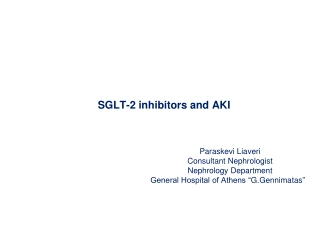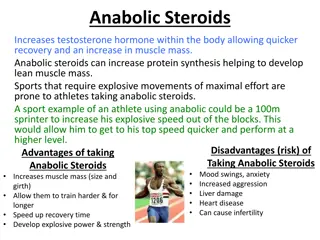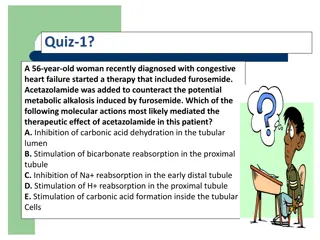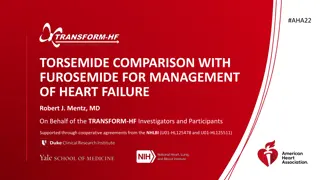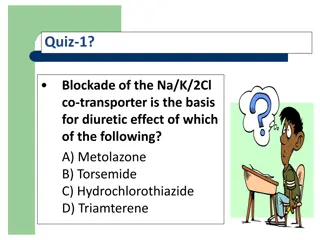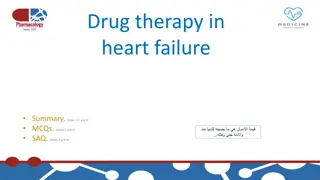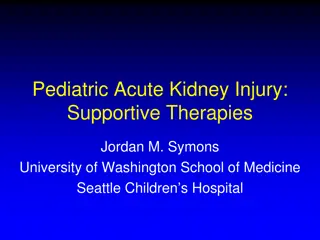SGLT-2 inhibitors and AKI
Consultant Nephrologist Paraskevi Liaveri discusses the association between SGLT-2 inhibitors and acute kidney injury (AKI). Pharmacovigilance reports highlight a higher risk of AKI with these drugs, especially when combined with RAAS blockers, diuretics, or NSAIDs. Studies suggest potential mechani
0 views • 49 slides
Performance-Enhancing Drugs in Sports: Types and Effects
Anabolic steroids, beta-blockers, diuretics, narcotic analgesics, and peptide hormones are commonly used in sports to enhance performance. Each drug has specific advantages and disadvantages, impacting athletes' physical and mental health. While some drugs enhance muscle growth and speed up recovery
0 views • 8 slides
Pharmacology Quizzes on Diuretics and Their Clinical Applications
This content presents a series of quizzes involving diuretics and their role in clinical scenarios related to heart failure, glaucoma, renal hemodynamics, and intracranial pressure. Questions cover various diuretic agents such as furosemide, acetazolamide, mannitol, and hydrochlorothiazide, focusing
0 views • 10 slides
Torsemide vs. Furosemide in Heart Failure Management Study Overview
This study compares the long-term effects of torsemide versus furosemide in the management of heart failure. Torsemide may offer advantages such as more consistent oral bioavailability and longer action duration. The study aims to determine if torsemide reduces mortality by 20% compared to furosemid
0 views • 15 slides
Diuretic Mechanisms and Medications: Quiz Questions and Answers
Explore a series of quiz questions focusing on diuretic medications, their mechanisms of action, and clinical scenarios. Topics include the diuretic effects of specific medications, management of idiopathic hypercalciuria, drug interactions in elderly patients, effects of loop diuretics on ionic exc
0 views • 10 slides
Pharmacotherapy for Heart Failure: A Comprehensive Review
In heart failure management, drugs play a crucial role in reducing preload and afterload, increasing cardiac contractility, and improving overall outcomes. Common drug classes include diuretics, aldosterone antagonists, ACE inhibitors, ARBs, beta-blockers, and vasodilators. These medications help al
0 views • 8 slides
Management of Malignant Ascites in Advanced Cancer: ESDO Learning
Malignant ascites is a challenging complication of advanced cancer, impacting patient quality of life and survival. Diagnosis involves imaging and cytology, with poor prognostic indicators. Management includes symptom relief with diuretics, paracentesis, and catheter options. Refractory cases presen
0 views • 7 slides
Retrospective Evaluation of Pragmatic Deprescribing in Skilled Nursing Facilities
This study evaluated the effectiveness of a pragmatic deprescribing protocol in reducing medication classes in two skilled nursing facilities. Findings showed significant reductions in diuretics, opioids, antipsychotics, and antibiotics, with slight overall medication changes. Increases in anticoagu
0 views • 6 slides
Pediatric Acute Kidney Injury Management Insights
Explore supportive therapies, stage-based management, natural history, and challenges in Acute Kidney Injury (AKI) along with conservative and pharmacotherapeutic approaches. Learn about the role of diuretics, considerations in established AKI management, and historical perspectives on kidney therap
0 views • 26 slides
